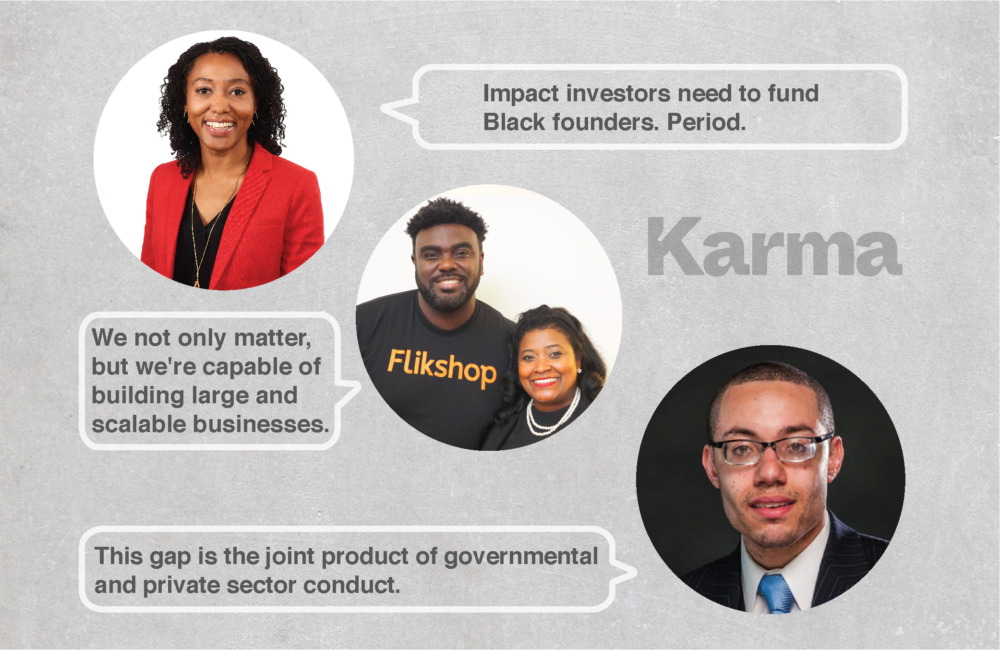George Floyd’s death while being arrested by Minneapolis police sparked a range of reactions from peaceful protests to property destruction, from individual soul-searching to countless discussions about racial inequality around the world — including among the impact investing community.
Karma asked black entrepreneurs and investors for their views on how impact investors might address the centuries-long American problem of racial injustice. Here’s what they shared:
Tanay Tatum-Edwards, Founder & CEO of FreeCap Financial, which seeks to reform the criminal justice system.
Comments are emailed.
“Impact investors need to fund Black founders. Period.
“The most innovative solutions come from the communities that have experienced them and from entrepreneurs with firsthand experience of the social problems investors are trying to solve.
“A few years ago, while attending an impact investing conference, I sat in a room full of mostly white people who said they wanted to invest in racial equity and criminal justice reform but could not find any investment products that met their needs. At that moment, I realized just how out-of-touch the ‘social’ metrics in ESG investing were from the needs of Black people on the ground and from the retail investors who care about social causes.
“I had spent the better part of the previous decade researching the structures that fuel racial inequality and, as a Black woman, I had lived them daily. As I looked around this predominantly white audience, I realized that if I didn’t launch FreeCap – and bring a racial equity lens to ESG investing — who else would?
“Impact investors need to fund Black founders like me if they’re serious about solving racial equity.”
Marcus Bullock & Camille Clark, CEO and COO of Flikshop, which helps users send photos to incarcerated loved ones.
They spoke with Karma by phone.
Marcus: “As a black founder that has been pitching for years, I want to say: write a check. Write us a check, or commit to another black or brown founder that signals to the rest of the world that yes, we not only matter, but we’re capable of building large scalable businesses that impact the world.
“There are calls and rounds, but the reality is that relationships write checks anyway: ‘My son went to school with your daughter and they have a business they’re thinking about launching’ — that writes a check.
“When I come into it investors’ offices, and I say, ‘I’m post-revenue, we have 170,000 registered users sending thousands of these postcards every day in a market that none of you have ever thought about, and we are primed to be a billion-dollar company that can scale this kind of technology globally,’ they say: ‘I want to see your data and your financials.’ They ask you what your marketing plan is. And then they say, ‘well, how big is this market?’ And then they say ‘Well, I don’t know that market, so who are your advisors? Who’s written you a check before?’”
Camille: “I’ve made a couple of phone calls to friends that are adjacent to the VC space, and they said exactly what Marcus just said: our market and the fact that it’s the two of us, it doesn’t matter that I have 20 years of being a director at financial services firms with staff and graduated magna cum laude. All they see is our two faces, and we get the extra scrutiny.”
Ron Stubblefield, Entrepreneur in Residence with JumpStart, a Cleveland-based venture development organization.
Comments are emailed.
“A recent Brookings Institute report showed white families have, on average, $171K in net worth. This amount is ten times what a Black or brown family has on average. This gap is the joint product of governmental and private sector conduct.
“With $171K, many white households can provide their children, friends or themselves with early business funding through a Friends, Family, and Founders (FFF) round. This FFF funding is often a necessity when launching a tech company because debt financiers will not invest in this level of risk, and institutional venture capital is often not available until you have demonstrated some traction.
“Meanwhile, the Black or brown family has $17K, which will barely fund an adequate emergency savings fund. They cannot afford to make FFF investments. It is for this reason why groups such as Living Cities mention the need for more funds dedicated to addressing this gap. Until this gap is addressed, getting more black tech companies off the ground is not going to happen.
“If firms are willing to finance this off their balance sheets and provide ongoing support for these entrepreneurs, it shows a serious commitment to black business and economic development that is genuinely needed.”
(Read the first installment in this series.)
Karma’s Ron Day contributed to this story.
Karma wants to hear what actions you are taking or believe should be taken. Write to us at hello@karmaimpact.com or message us on Twitter @thekarmaimpact.























